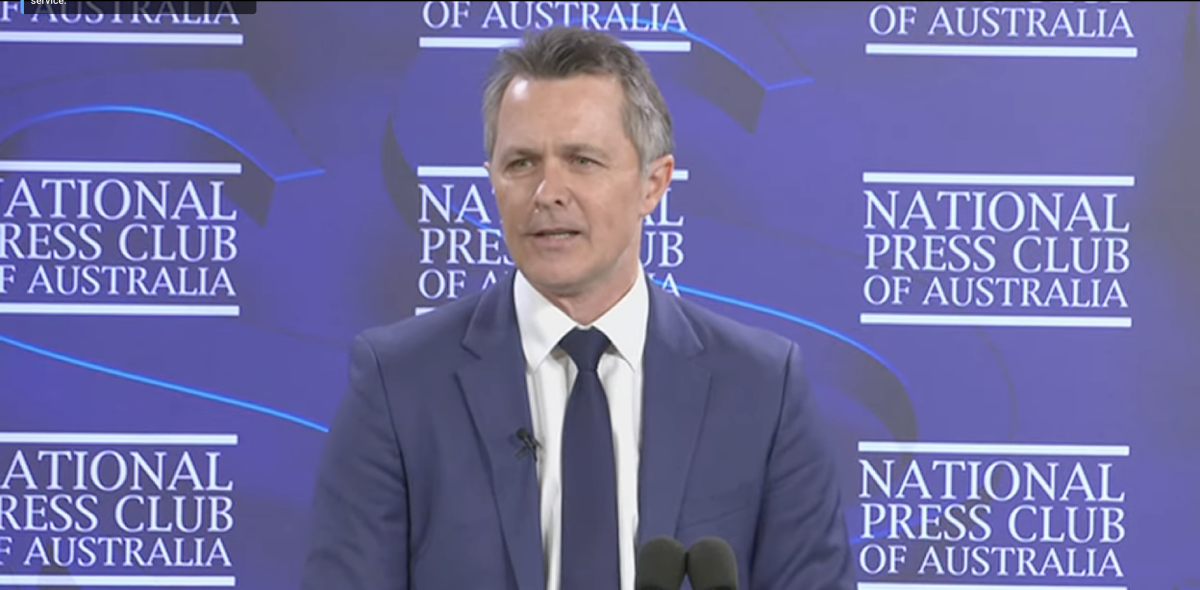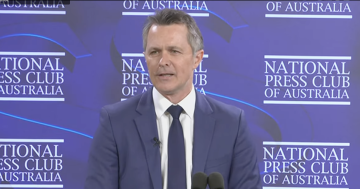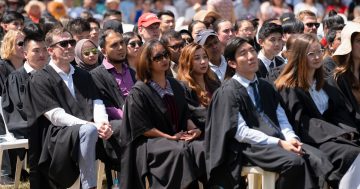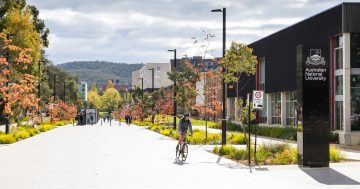
Education Minister Jason Clare talking universities accord at the National Press Club. Photo: Screenshot.
University students who fail their first year will no longer be forced to quit their studies but instead be encouraged to persevere, as part of a new push to get more young Australians tertiary qualified.
More Indigenous students who qualify for university will be guaranteed a Commonwealth-supported place, regardless of where they live.
And the Higher Education Continuity Guarantee will also be extended for a further two years to provide funding certainty.
The Federal Government has vowed to immediately act on the first recommendations of the Australian Universities Accord’s interim report, which sets out a pathway to greater accessibility to higher education for more Australians.
With a strong focus on attracting and retaining Indigenous students, as well as others from underrepresented demographics, the report suggests the percentage of university-educated Australians in the workforce could jump from 36 per cent to 55 per cent by the middle of this century if targeted policies are implemented.
Education Minister Jason Clare said while there are more than 70 areas the accord panel, chaired by Professor Mary O’Kane, has put up for consideration, there are five urgent actions it thinks should be implemented now.
The minister said the government would act on all five before the accord’s final report is delivered at the end of the year.
Those areas of action are:
- Establish up to 20 additional regional university study hubs (formerly regional university centres), building on the 34 existing regional university study hubs currently operating across the country, and establish up to 14 suburban university study hubs.
- Abolish the 50 per cent pass rule, introduced as part of the Job-ready Graduates Scheme, which has had a disproportionately negative impact on students from poor backgrounds and from the regions, and require increased reporting on student progress.
- Extend demand-driven funding to all First Nations students who are eligible for the course they apply for. Currently, this only applies to First Nations students in regional and remote Australia.
- Extend the Higher Education Continuity Guarantee for a further two years to provide funding certainty to universities as the accord process rolls out, and as part of this require universities to invest any remaining funding from their grant each year on additional academic and learning support for students from poor backgrounds, from the regions and from other underrepresented groups.
- Work with state and territory governments to improve university governance. This includes university governing bodies having more people with expertise in the business of universities, and a focus on student and staff safety and making sure universities are good employers.
Speaking at the National Press Club after releasing the interim report publicly, Mr Clare said finishing university today “really is your ticket to the show” with increasingly more jobs requiring degrees.
“We live in a world where almost every single new job that’s created will require you to finish school and go to TAFE or uni,” he said.
“That means we need more people to do that. Not less. Rich. Poor. City. Bush. Black. White.”
Describing the “power of education” as the most powerful cause for good in this country, the minister said while almost one in two young people today had a degree, that wasn’t the case for every location.
“If we are honest, it still hasn’t made its way into every corner of our country,” Mr Clare said.
“The truth is children from poorer families are still less likely to go to preschool than children from wealthier families. They’re also less likely to finish high school, and less likely to go to university.
The same is true if you grow up in the bush or the regions. Or if you are an Indigenous Australian. If you are one of those children, you are three times more likely to fall behind at school today.”
The minister was particularly critical of the rule introduced by the former Coalition government that students who attempted at least eight study units and failed more than half were no longer eligible for further Commonwealth support for that course.
He pointed to Western Sydney University, where this year alone that rule has already led to 1350 students being forced to quit.
“Most of them from poor backgrounds,” Mr Clare said.
“More than 13,000 students at 27 universities have already been hit by this.
“Instead of forcing them to quit we should be helping them to pass.”
Original Article published by Chris Johnson on Riotact.










